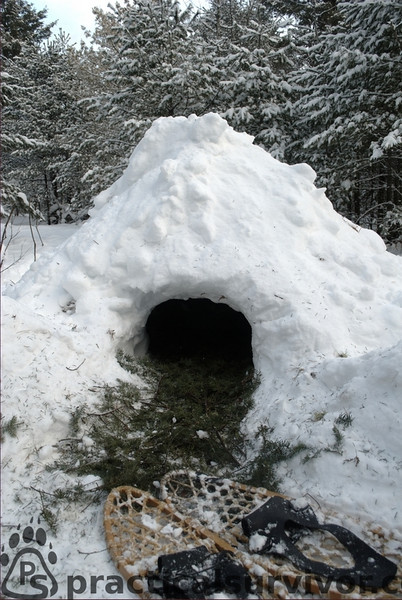Winter Shelter

You can transform your home into a winter shelter or you can build one, but whichever you choose you need to survive warm, dry and hydrated. Cold weather can numb your body, mind and will to survive and it offers unique challenges, such as needing to keep warm but not to the point of sweating.
Shelter in Place
When you plan to stay in your home or an existing structure, you can winter proof it and decide how you are going to heat it in the event of any power disruption. Wood is an option and hardwood burns with minimal smoke but if your hunkering down in a heavily populated area, you might not want to advertise that you have heat and provisions.
Propane is a smokeless fuel but supply might be interrupted in an apocalyptic event, making solar powered energy or solar powered generators definite possibilities.
You need to assess your home to fill in spaces that let in the cold air, especially around doors and windows. You should cover your pipes with insulation, like foam rubber or fiberglass sleeves, and know how to turn off your water and drain your pipes if you are unable to keep them from freezing.
You can build a winter shelter within your home instead of trying to heat the entire house. Building a cardboard shelter in a triangular shape as opposed to square will only require insulating three walls instead of four. By insulating the walls of your triangular shelter, your body heat will keep you warm and you have a shelter within a shelter.
Outside Shelters
When you are outside you have a number of options depending if the ground is snow covered or not. You can make a winter shelter in the snow for yourself, but it is important to make it small as you can use your body heat to keep warm. You also need two ventilation holes to allow enough oxygen into your shelter and noxious gases out of it.
With snow, you can build a winter survival shelter in a number of ways such as:
- Snowcave shelter - Use a large snow drift about 10 feet or 3 meters deep.
- Snowblock and parachute shelter - Use blocks of snow for the walls with parachute material for the roof.
- Snowhouse - Cut and stack snowblocks to make a shelter.
- Lean-to - Pile snow around the lean-to for extra insulation.
If snow cover is not an option, you can use a fallen tree, a large tree limb or tree pit shelter. You pile tree limbs over the fallen tree or limb to form a shelter and if you have security concerns, it is recommended that you cut your additional limbs from trees away from your shelter.
Moisture Barrier
You should use a sleeping pad, such as an inflatable mattress, compressed foam mattress or closed-cell foam on the floor of your winter survival shelter. The pads protect you from the radiating cold or moisture from the ground or the snow. If you are caught without a pad, tree branches, grass and pine needles also serve as a barrier against the heat absorbing ground or snow.
Why a Winter Survival Shelter?
Frostbite often starts with a pins and needle feeling on your exposed skin, then numbness and then the skin turns cold, pale and hard and often frostbite occurs with or before hypothermia. You need to be aware of the symptoms as either condition can kill, so it is very important to quickly get into a shelter where you can begin to warm your body.
When you are going out into the cold, layer your clothing with an inner layer to draw moisture away from the body, a layer to insulate and an outer layer that is water resistant and tough enough to resist tearing. Adding a hat, 2 layers of socks and gloves, you can safely go out in the cold and with a properly constructed winter shelter, you have a place to return to get warm, eat and get rested.
Return from Winter Shelter to Survival Retreat





New! Comments
Have your say about what you just read! Leave me a comment in the box below.